Events
Belarus, Russia issue joint report on human rights situation in certain countries
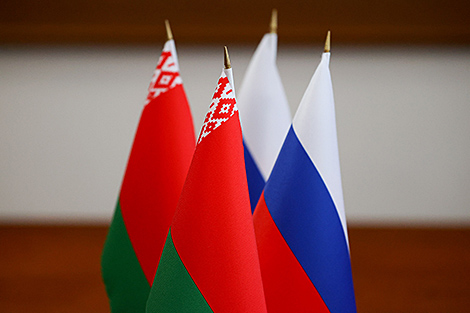
An archive photo
MINSK, 20 June (BelTA) - The Ministries of Foreign Affairs of Belarus and Russia have prepared the first joint report on the human rights situation in certain countries. The document was published on the websites of the foreign ministries on the morning of 20 June, BelTA has learned.
The review covers more than 40 countries. Among them are many EU countries (including the closest neighbors of Belarus), the UK, the United States, Canada, Japan, Australia and New Zealand, Ukraine, Moldova and others.
A very detailed fact-finding report has been prepared for every country. As visual confirmation, the document has numerous photos. The document is large, more than 1,800 pages long!
Addresses to readers were written by Belarusian Minister of Foreign Affairs Yuri Ambrazevich and Russian Deputy Foreign Minister Sergei Vershinin. As they noted, the facts the Report contains show that racist and neo-colonial views are typical of Western "model democracies" in principle.
“This is clearly reflected in their desire to impose a ‘rules-based order’ they themselves have devised and to oppose it to international law. This approach builds on an inherently racist division of states into those who ‘have the right’ to lay down these rules and those who must strictly follow them, be it even to the detriment of their national interests,” the authors said.
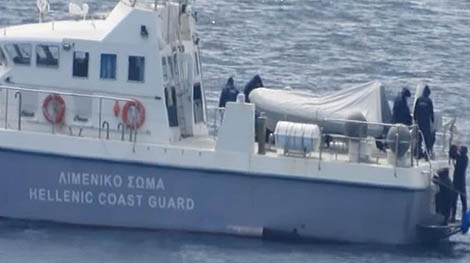
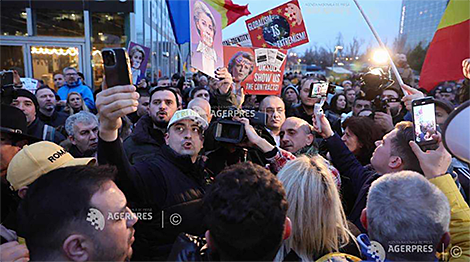
The Report provides real case examples from both the present and the recent past, which, for the most part, we are all well aware of, to illustrate the negative human rights practices and trends the entire constructive-minded international community needs to stand up to.
“With this in mind, we would recommend that the reader, when going through the ‘country’ sections of the Report, bear in mind the fact that these very states are actively trying to ‘export’ democratic and human rights standards as universal ones and to tell others about their ‘shortcomings’ and, in fact, to interfere with their internal affairs. Under this pretext, the ‘collective West’, which ranks behind the rest of the world in terms of population, is indiscriminately criticizing the human rights situation in undesirable countries of the world majority – undesirable only because they pursue an independent foreign policy agenda and defend their own historical, cultural and religious values and norms without imposing them on anyone,” the deputy ministers stressed.
With regard to the human rights issues raised in the Report, the authors highlight the use of so-called double-standards while assessing certain situations and phenomena remains a major challenge in this field.
“A number of countries are openly promoting racist ideas and values, provoking the upsurge of radical nationalism. And this is happening despite the fact that there are legal mechanisms in place within the United Nations, the OSCE and a number of other international organizations aimed at countering the glorification of Nazism, racism, xenophobia and related intolerance. We can already see a group of States where structural racism and manifestations of intolerance have permeated all spheres of public life (relevant analysis is included in the respective sections of the Report). Attempts to split societies based on ethnic origin and language are mounting,” the authors noted.
Furthermore, some countries are witnessing a steady growth in xenophobic and racist incidents, a surge of aggressive nationalism, chauvinism and other forms of racial and religious intolerance. Authorities in these countries are trying to justify their failure to act by hypocritically claiming the allegedly absolute nature of the right to freedom of expression.
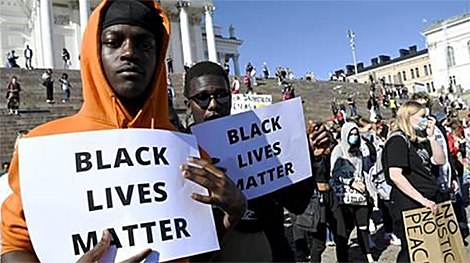
However, such connivance is nothing new, especially since Western "model democracies" are no strangers to racist and neo-colonial views – examples abound in our time, and even more so in the history of the twentieth century, and particularly of World War II. Such duplicity of the West was demonstrated by the events of 2022 and its declared "crusade" against the "Russian world", the preface reads.
Particularly noteworthy, according to the authors, are the efforts of Western countries and their allies to rewrite the history and revise the outcomes of World War II, their cynical attempts to whitewash war criminals and their accomplices – those who devised and put into practice the theory of racial superiority. These also include the glorification of Nazi collaborators as members of national liberation movements, introduction of related topics as subjects in general compulsory education curricula, and extensive efforts to whitewash the criminals.
“Based on the analysis of the information provided in the Report, the following general conclusion can be drawn. In the emerging new world, which should be based on a fairer system of international relations, the full realization of the principle of the sovereign equality of States and the historical, cultural, religious and national particularities of each country is essential,” the authors said. “Only on that basis would the negative effects of colonialism, neo-colonial thinking, racism, racial discrimination and related intolerance be fully eradicated. This would prevent unlawful attempts by certain countries to "bring to heel" the international law system and use its universal human rights mechanisms to suit their own parochial and vested interests.”
Below are just a few examples of the human rights situation in a number of countries listed in the Report. The full document can be found on the websites of the foreign ministries of Belarus and Russia.
Lithuania
The human rights situation in the Republic of Lithuania, already unfavourable as a whole, continues to steadily go down. The country remains to be distinct in numerous restrictions to free opinions, discrimination of national minorities, primarily in the area of education, manifestations of xenophobia and antisemitism, persecution for policy and other reasons as well as glorification of Nasizm and rabid Russophobia.
A serious economic crisis that has manifested itself in Lithuania and also in other Baltic States redoubles the negative state of affairs. “Macroeconomic indicators [of Lithuania, Latvia and Estonia] have been rapidly declining in recent times. They have found themselves among the EU leaders in terms of GDP and industrial production fall. Besides, the local population faces a soaring cost of basic goods and services, utility tariffs and high inflation,” the document reads.
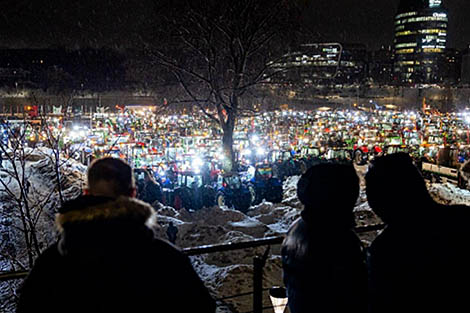

On 15 January 2024, Lithuanian authorities detained Antanas Kandrotas (pictured), nicknamed "Celofanas". He was found guilty of major financial fraud. The detention took place in the presence of his minor children. However, during the detention, the police officers did not comply with the provisions of the legal acts that provide for informing the State Child Rights Protection and Adoption Service about the use of procedural coercion. In the detention center in Kaunas, police officers mistreated Antanas Kandrotas.
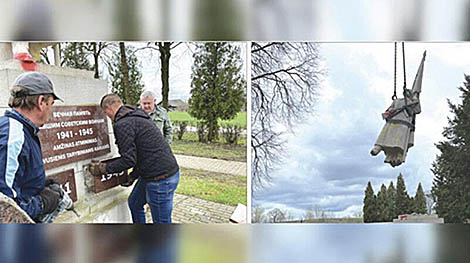
Exoneration and glorification of the "Forest Brothers" (in Lithuanian interpretation – "partisans") is carried out under guise of the "heroes of the national liberation movement" and "fighters against the Soviet regime". It should be remembered that groups of these "activists", numbering up to 30 thousand people, acting on the territory of Lithuania from 1944 to 1956, are responsible for the death of over 25 thousand civilians, including children, women and the elderly. Most of the victims were ethnic Lithuanians. Many of the band members actively collaborated with the occupation administration of the Third Reich and were part of it, were directly involved in the Holocaust in Lithuania during World War II.
Along with this, the Lithuanian leadership is making efforts to glorify the participants of the Nazi Waffen-SS and conceal the surviving collaborators from trial. At the beginning of January 2022, it became known that the Lithuanian authorities (as before in Latvia) officially refused to provide assistance to Belarus in the investigation of the criminal case of the genocide of the Belarusian people during the Great Patriotic War. Vilnius and Riga refused legal assistance to Minsk in the investigation of the massacre of civilians, citing as justification that such interaction could affect issues of their national security.
Moldova
The situation regarding the observance of fundamental human rights in Moldova is alarming. “The ruling forces are leading the country towards a complete collapse of its economy, its total dependence on Western financial institutions and a demographic catastrophe due to mass emigration,” the document reads. “What is happening today in Moldova almost completely coincides with the processes that were seen in Ukraine. The Sandu regime, like Vladimir Zelensky and Petr Poroshenko before him, "on the way to European integration" seeks to cancel an entire period of its own country's history by totalitarian methods, destroying the totality of the Soviet heritage, including all manifestations of the culture of national minorities. Moreover, for the sake of the EU accession, the Moldovan authorities even demonstrate their readiness to destroy the national – Moldovan – identity, passing it off as Romanian,” the document continues.
On the instructions of Western curators, official Chisinau copies in its policy the actions of the nationalist regimes of Ukraine and the Baltic states, based on Russophobia and caveman anti-Sovietism borrowed from the Cold War. Such a policy cultivates in society the idea that confrontation with Russia now or in the past, including in the Soviet Union, appears to be the only right thing to do, artificially establishing the equivalence of the concepts "Russian" – "communist" – "fascist".
Poland
“Current Polish authorities make all possible efforts to falsify the history of World War II, blindly believing that this will contribute to improving the image of the country. The cause-and-effect connections and evaluation of the events during that tragic time for all humanity are deliberately distorted to fit political circumstances. Denials of the Red Army's decisive contribution to the defeat of Hitler's Germany are being propagated, and attempts are being made to eradicate the Soviet/Russian war memorial heritage in Poland,” the report remarks. Under the banner of combating "Soviet propaganda" and shaping the "correct" history of World War II, a cult of even those "fighters against communism" who were stained by collaboration with the Nazis, war crimes and the killing of civilians is being cultivated in Poland.
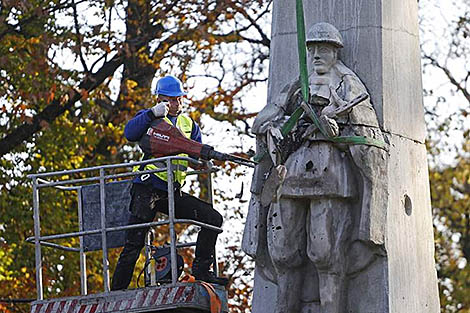
Poland is among the nations whose authorities are actively demolishing monuments and memorials in tribute to Red Army soldiers who have lost their lives during the country's liberation from Nazism in World War II. In Poland, the distribution of items bearing Nazi symbols or the publication of Nazi literature is common. For instance, in January 2021, an academic edition of Adolf Hitler's Mein Kampf was published in Poland. This was the second edition, with the first being published in the early 1990s. This caused uproar in the country.
Xenophobia and intolerance towards migrants are on the rise in Poland. Polish and international human rights NGOs attribute this to the coming to power of the national conservative Law and Justice (PiS) party in October 2015 and its reforms.
The brutal treatment of refugees by Polish border guards has become public knowledge.


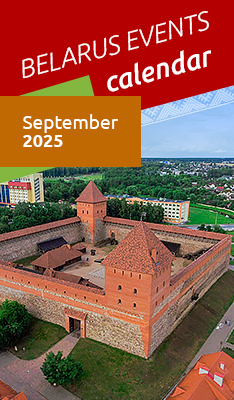




 print version
print version make home page
make home page add to bookmarks
add to bookmarks

